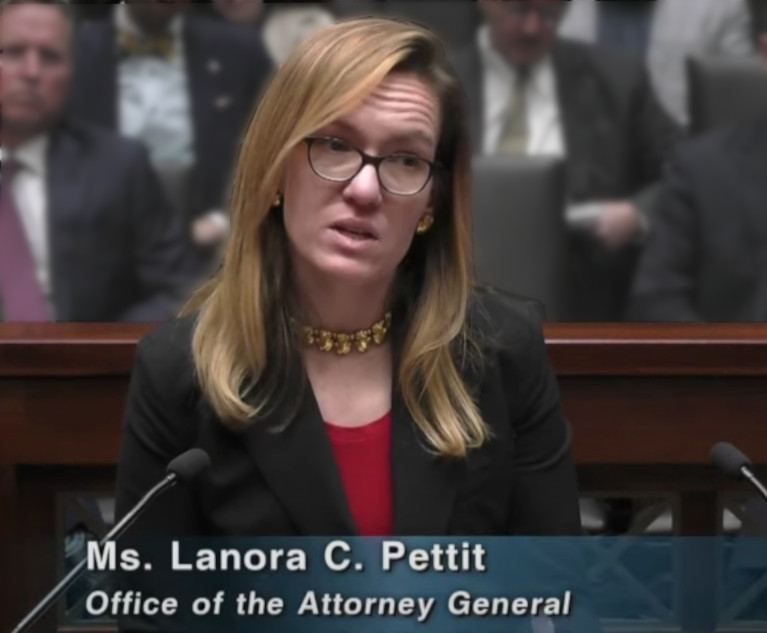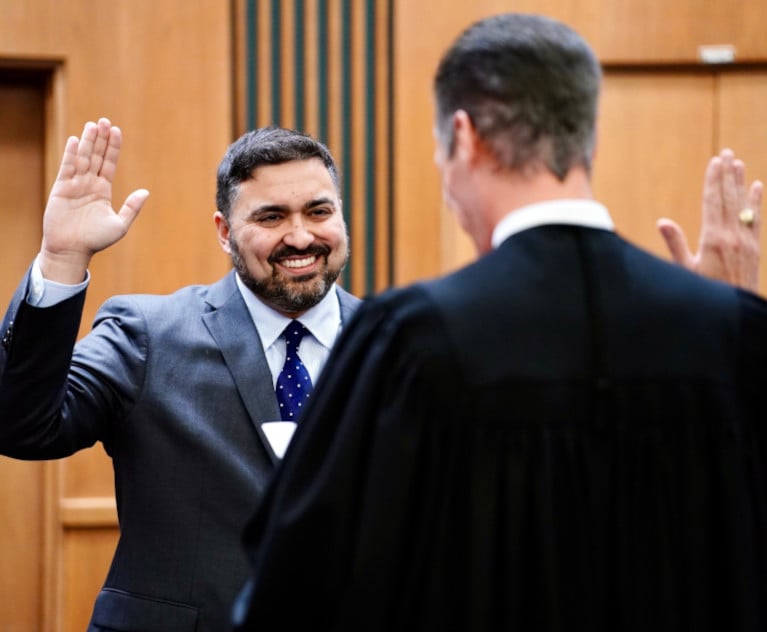County Attorney Seeks End to Texas Judge's Alleged Pay-to-Plea System, Dubbed the 'Shahan Shake-Down'
“Judge Shahan maintains a policy that requires defendants to pay their fines and court costs in full before the court will conduct a hearing to receive a plea of guilty and formally pronounce the sentence,” claimed Kinney County Attorney Todd Durden.
June 17, 2019 at 01:25 PM
7 minute read
 Kinney County Courthouse in Brackettville, Texas. Photo: Larry D. Moore/Wikimedia Commons
Kinney County Courthouse in Brackettville, Texas. Photo: Larry D. Moore/Wikimedia Commons
As a home health provider in small-town Texas, Maria Cervantes and her children live on just $400 per month.
She found herself in a hard spot when she was charged with driving while intoxicated in Kinney County. Though she wanted to accept a plea agreement before the court allowed her to plead guilty and start her probation, she'd have to scrape up $897 — more than two months' income — to pre-pay her fine and court costs. It meant taking on debt from loans from family and friends.
“She struggled to get the $800 and I didn't find it out until we were in court and she told me she had been paying, and I said, 'What?'” said her attorney, Del Rio solo practitioner Ruben Nino. ”I think it's wrong. The way the system is supposed to work is that you are innocent until when you plead guilty. A person that has not entered a plea of guilty should not be paying fees and court costs before they've even been placed on probation.”
It might seem an unlikely place, but Cervantes has found a powerful advocate in the prosecutor in her DWI case.
Kinney County Attorney Todd Durden has taken Cervantes' dilemma to a higher court by asking San Antonio's Fourth Court of Appeals for emergency relief to end what he calls a “pay-to-plea” system in his county. He claims the procedure violates due process and breaks a 2017 Texas law that says defendants owe court costs and fees only after they're convicted. In an order on June 11, the Fourth Court wrote that Durden has raised serious questions and ordered two local judges and interested parties to respond by June 27.
“I have a duty as a prosecutor under Texas law to see the presumption of innocence is not impaired. There's just so many things wrong with it,” Durden said. “It's hard in a county like this—there's one county judge, there's one district judge—to basically challenge an existing practice that's condoned and basically accepted as normal an appropriate.”
Kinney County Judge Tully Shahan and 63rd District Judge Henry Fernandez, who sat as an appointed judge in Kinney County, are respondents in Durden's June 5 petition for writ of mandamus, which also lists as real parties in interest 14 defendants, Kinney County, its district, county clerk and more.
 Photo: Shutterstock.com
Photo: Shutterstock.com“Judge Shahan maintains a policy that requires defendants to pay their fines and court costs in full before the court will conduct a hearing to receive a plea of guilty and formally pronounce the sentence,” said the petition, which claimed that local criminal-defense attorneys call the practice the “Shahan Shake-down.”
Shahan and Fernandez didn't return calls seeking comment, but Allison, Bass & Magee partner Robert T. “Bob” Bass of Austin, who represents Kinney County and its officials, said it's not true that the so-called pay-to-plea procedure originated with Shahan.
“He denies that he had anything to do with it,” said Bass, explaining that Durden's predecessor as county attorney, Bob Adams, created a voluntary prepayment procedure to accommodate indigent defendants who wanted to plead guilty but worried that if they defaulted on a payment toward their fines and costs, they would face probation revocation and jail time.
“Mr. Durden has filed for mandamus under false pretenses,” said Bass. “His allegations about pay-to-plea are essentially untrue.”
Durden disputes how pay-to-plea started. He said that before he was judge, Shahan served as county attorney for 30 years and he launched the prepayment policy at some point in his tenure. Later, as judge, Durden claimed that Shahan convinced Adams to reinstate prepayments. Shahan told Durden that he wanted defendants to pre-pay costs and fines so that he could collect more money for Kinney County, said Durden.
Emergency Relief
In the mandamus petition, Durden is asking the Fourth Court for a determination that Shahan can't demand advance payment of fines and court costs, the court clerk can't receive them, and the clerk must return already collected funds to pending defendants. He also asked the Fourth Court to disqualify Shahan from presiding over criminal cases.
He claimed the pay-to-plea policy inserts the judge into the prosecution of cases. Before docket call, Shahan meets with Durden or his legal assistant to review plea agreements and charging instruments, highlight the plea agreements he will accept, and set the amount of fines and costs. On docket call day, Durden meets with defendants, asks them to sign a waiver of counsel and informs them of their plea offers. Next, they wait in Shahan's courtroom and hear how much they owe in fines and costs, which is recorded on a “Case Reset Form.” Shahan then resets the case, sometimes multiple times.
“When the fine and court costs are paid in full, the defendant is permitted to plead guilty and begin the terms of community supervision,” said the petition.
Durden explained that in Cervantes' case, he and Nino, the court-appointed defense counsel, agreed to decrease a fine and impose longer community supervision. But when counsel announced their plea agreement, Shahan “flatly denied it without hearing any evidence.” Shahan then berated Durden in the courtroom, which surprised Nino, according to his affidavit about the incident.
“It was made very clear to the county attorney that the county judge would not allow him to change the plea agreement terms that the county judge had established,” said the petition.
Cervantes' case was eventually dismissed by visiting judge Fernandez on the state's motion. Nino moved for Cervantes to get a refund of her $897 prepayment but Fernandez ordered a refund of just $500.
Nino noted that the remaining $397 in court costs represents nearly a month's worth of living expenses for Cervantes and her family.
Durden claimed in the petition that he stopped participating in the pay-to-plea system and the county retaliated against him when Shahan and the commissioners court reduced his salary by 20%.
Durden has sued the county separately over his pay cut.
But Bass, the lawyer for the county, said the whole dispute started with the salary cut. Commissioners docked Durden's pay by $5,000 because they believed he wasn't showing up for work and “just isn't taking care of business,” Bass said. Since the pay cut, Durden has filed at least four lawsuits against the county, Bass said.
“Mr. Durden would make it out that he's the victim. Well—he's not the victim,” Bass said. “The county's spent an enormous sum of money defending itself against its own county attorney, who's not doing the job he was elected to do.”
But Durden said he's doing high-quality work, but the dispute between himself and the judge has frozen cases from moving through the court system. Durden said he's not challenging the pay-to-plea system because of the salary dispute.
“The pay cut would probably have gone away and not be there if I had not been fighting pay-to-plea,” he said. “It is retaliation. No one in this county will stand up to them.”
Read the mandamus petition:
This content has been archived. It is available through our partners, LexisNexis® and Bloomberg Law.
To view this content, please continue to their sites.
Not a Lexis Subscriber?
Subscribe Now
Not a Bloomberg Law Subscriber?
Subscribe Now
NOT FOR REPRINT
© 2025 ALM Global, LLC, All Rights Reserved. Request academic re-use from www.copyright.com. All other uses, submit a request to [email protected]. For more information visit Asset & Logo Licensing.
You Might Like
View All


Trending Stories
Who Got The Work
J. Brugh Lower of Gibbons has entered an appearance for industrial equipment supplier Devco Corporation in a pending trademark infringement lawsuit. The suit, accusing the defendant of selling knock-off Graco products, was filed Dec. 18 in New Jersey District Court by Rivkin Radler on behalf of Graco Inc. and Graco Minnesota. The case, assigned to U.S. District Judge Zahid N. Quraishi, is 3:24-cv-11294, Graco Inc. et al v. Devco Corporation.
Who Got The Work
Rebecca Maller-Stein and Kent A. Yalowitz of Arnold & Porter Kaye Scholer have entered their appearances for Hanaco Venture Capital and its executives, Lior Prosor and David Frankel, in a pending securities lawsuit. The action, filed on Dec. 24 in New York Southern District Court by Zell, Aron & Co. on behalf of Goldeneye Advisors, accuses the defendants of negligently and fraudulently managing the plaintiff's $1 million investment. The case, assigned to U.S. District Judge Vernon S. Broderick, is 1:24-cv-09918, Goldeneye Advisors, LLC v. Hanaco Venture Capital, Ltd. et al.
Who Got The Work
Attorneys from A&O Shearman has stepped in as defense counsel for Toronto-Dominion Bank and other defendants in a pending securities class action. The suit, filed Dec. 11 in New York Southern District Court by Bleichmar Fonti & Auld, accuses the defendants of concealing the bank's 'pervasive' deficiencies in regards to its compliance with the Bank Secrecy Act and the quality of its anti-money laundering controls. The case, assigned to U.S. District Judge Arun Subramanian, is 1:24-cv-09445, Gonzalez v. The Toronto-Dominion Bank et al.
Who Got The Work
Crown Castle International, a Pennsylvania company providing shared communications infrastructure, has turned to Luke D. Wolf of Gordon Rees Scully Mansukhani to fend off a pending breach-of-contract lawsuit. The court action, filed Nov. 25 in Michigan Eastern District Court by Hooper Hathaway PC on behalf of The Town Residences LLC, accuses Crown Castle of failing to transfer approximately $30,000 in utility payments from T-Mobile in breach of a roof-top lease and assignment agreement. The case, assigned to U.S. District Judge Susan K. Declercq, is 2:24-cv-13131, The Town Residences LLC v. T-Mobile US, Inc. et al.
Who Got The Work
Wilfred P. Coronato and Daniel M. Schwartz of McCarter & English have stepped in as defense counsel to Electrolux Home Products Inc. in a pending product liability lawsuit. The court action, filed Nov. 26 in New York Eastern District Court by Poulos Lopiccolo PC and Nagel Rice LLP on behalf of David Stern, alleges that the defendant's refrigerators’ drawers and shelving repeatedly break and fall apart within months after purchase. The case, assigned to U.S. District Judge Joan M. Azrack, is 2:24-cv-08204, Stern v. Electrolux Home Products, Inc.
Featured Firms
Law Offices of Gary Martin Hays & Associates, P.C.
(470) 294-1674
Law Offices of Mark E. Salomone
(857) 444-6468
Smith & Hassler
(713) 739-1250







